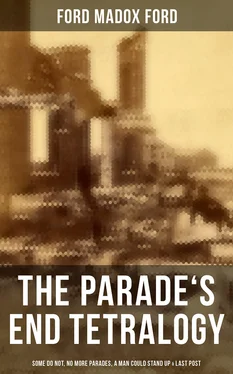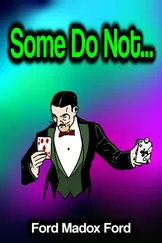He stopped suddenly in his walk. It had occurred to him that he ought not to be walking with this girl!
‘But damn it all,’ he said to himself, ‘she makes a good screen for Sylvia . . . who cares! She must chance it. She’s probably struck off all their beastly visiting lists already . . . as a suffragette!’
Miss Wannop, a cricket pitch or so ahead of him, hopped over a stile: left foot on the step, right on the top bar, a touch of the left on the other steps, and down on the white, drifted dust of a road they no doubt had to cross. She stood waiting, her back still to him . . . Her nimble footwork, her attractive back, seemed to him, now, infinitely pathetic. To let scandal attach to her was like cutting the wings of a goldfinch: the bright creature, yellow, white, golden and delicate, that in the sunlight makes a haze with its wings beside thistle-tops. No; damn it! it was worse; it was worse than putting out, as the bird-fancier does, the eyes of a chaffinch . . . Infinitely pathetic!
Above the stile, in an elm, a chaffinch said: ‘Pink! pink!’ The imbecile sound filled him with rage; he said to the bird:
‘Damn your eyes! Have them put out, then!’ The beastly bird that made the odious noise, when it had its eyes put out, at least squealed like any other skylark or tom-tit. Damn all birds, field naturalists, botanists! In the same way he addressed the back of Miss Wannop: ‘Damn your eyes! Have your chastity impugned then! What do you speak to strange men in public for? You know you can’t do it in this country. If it were a decent, straight land like Ireland where people cut each other’s throats for clean issues: Papist versus Prot . . . well, you could! You could walk through Ireland from east to west and speak to every man you met . . . “Rich and rare were the gems she wore . . . ” To every man you met as long as he wasn’t an Englishman of good birth: that would deflower you!’ He was scrambling clumsily over the stile. ‘Well! be deflowered then: lose your infantile reputation. You’ve spoken to strange pitch: you’re defiled . . . with the benefit of Clergy, Army, Cabinet, Administration, Opposition, mothers and old maids of England . . . They’d all tell you you can’t talk to a strange man, in the sunlight, on the links, without becoming a screen for some Sylvia or other . . . Then be a screen for Sylvia: get struck off the visiting books! The deeper you’re implicated, the more bloody villain I am! I’d like the whole lot to see us here: that would settle it . . . ’
Nevertheless, when at the roadside he stood level with Miss Wannop who did not look at him, and saw the white road running to right and left with no stile opposite, he said gruffly to her:
‘Where’s the next stile? I hate walking on roads!’ She pointed with her chin along the opposite hedgerow. ‘Fifty yards I’ she said.
‘Come along!’ he exclaimed, and set off at a trot almost. It had come into his head that it would be just the beastly sort of thing that would happen if a car with General Campion and Lady Claudine and Paul Sandbach all aboard should come along that blinding stretch of road: or one alone: perhaps the General driving the dog-cart he affected. He said to himself:
‘By God! If they cut this girl I’d break their backs over my knee!’ and he hastened. ‘Just the beastly thing that would happen.’ The road probably led straight in at the front door of Mountby!
Miss Wannop trotted along a little in his rear. She thought him the most extraordinary man: as mad as he was odious. Sane people, if they’re going to hurry—but why hurry!—do it in the shade of field hedgerows, not in the white blaze of county council roads. Well, he could go ahead. In the next field she was going to have it out with him: she didn’t intend to be hot with running: let him be, his hateful, but certainly noticeable eyes, protruding at her like a lobster’s; but she was cool and denunciatory in her pretty blouse . . .
There was a dog-cart coming behind them!
Suddenly it came into her head: that fool had been lying when he had said that the ‘police meant to let them alone: lying over the breakfast-table . . . The dog-cart contained the police: after them! She didn’t waste time looking round: she wasn’t a fool like Atalanta in the egg-race. She picked up her heels and sprinted. She beat him by a yard and a half to the kissing-gate, white in the hedge: panicked, breathing hard. He panted into it, after her: the fool hadn’t the sense to let her through first. They were jammed in together: face to face, panting! An occasion on which sweethearts kiss in Kent: the gate being made in three, the inner flange of the V moving on hinges. It stops cattle getting through: but this great lout of a Yorkshire-man didn’t know: trying to push through like a mad bullock! Now they were caught. Three weeks in Wandsworth gaol . . . Oh hang . . .
The voice of Mrs Wannop—of course it was only mother! Twenty feet on high or so behind the kicking mare, with a good round face like a peony—said:
‘Ah, you can jam my Val in a gate and hold her . . . but she gave you seven yards in twenty and beat you to the gate. That was her father’s ambition!’ She thought of them as children running races. She beamed down, round-faced and simple, on Tietjens from beside the driver, who had a black, slouch hat and the grey beard of St Peter.
‘My dear boy!’ she said, ‘my dear boy; it’s such a satisfaction to have you under my roof!’
The black horse reared on end, the patriarch sawing at its mouth. Mrs Wannop said unconcernedly: ‘Stephen Joel! I haven’t done talking.’
Tietjensns was gazing enragedly at the lower part of the horse’s sweat-smeared stomach.
‘You soon will have,’ he said, ‘with the girth in that state. Your neck will be broken.’
‘Oh, I don’t think so,’ Mrs Wannop said. ‘Joel only bought the turn-out yesterday.’
Tietjens addressed the driver with some ferocity:
‘Here, get down, you,’ he said. He held, himself, the head of the horse whose nostrils were wide with emotion: it rubbed its forehead almost immediately against his chest. He said: ‘Yes! yes! There! there!’ Its limbs lost their tautness. The aged driver scrambled down from the high seat, trying to come down at first forward and then backwards. Tietjens fired indignant orders at him:
‘Lead the horse into the shade of that tree. Don’t touch her bit: her mouth’s sore. Where did you get this job lot? Ashford market: thirty pounds: it’s worth more . . . But, blast you, don’t you see you’ve got a thirteen hands pony’s harness for a sixteen and a half hands horse. Let the bit out: three holes: it’s cutting the animal’s tongue in half . . . This animal’s a rig. Do you know what a rig is? If you give it corn for a fortnight it will kick you and the cart and the stable to pieces in five minutes one day.’ He led the conveyance, Mrs Wannop triumphantly complacent and all, into a patch of shade beneath elms.
‘Loosen that bit, confound you,’ he said to the driver. ‘Ah! you’re afraid.’
He loosened the bit himself, covering his fingers with greasy harness polish which he hated. Then he said:
‘Can you hold her head or are you afraid of that too? You deserve to have her bite your hands off.’ He addressed Miss Wannop: ‘Can you ?’ She said: No! I’m afraid of horses. I can drive any sort of car: but I’m afraid of horses.’ He said: ‘Very proper!’ He stood back and looked at the horse: it had dropped its head and lifted its near hind foot, resting the toe on the ground: an attitude of relaxation.
Читать дальше












